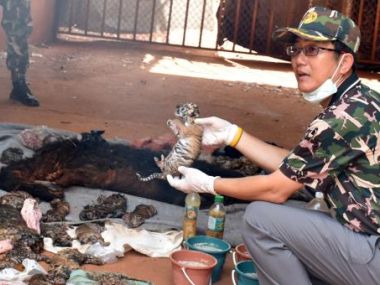Thai wildlife officials have discovered dozens of dead cubs inside a freezer at a controversial “tiger temple” which has been locked in a long-running dispute with authorities and animal rights groups, police said on Wednesday. Wildlife officials found the tiger cubs during a continuing operation to remove dozens of adult cats from the Wat Pha Luang Ta Bua temple in the western province of Kanchanaburi. “We found 40 tiger cubs today, they were aged about one or two days when they died but we don’t quite know yet how long they have been dead,” police colonel Bandith Meungsukhum, a local officer, told AFP. Adisorn Noochdumrong, the deputy head of Thailand’s parks department, said they would file charges against the temple for keeping the carcasses without permission. “A keeper said he was told to place the carcasses when they died in cold storage,” he told AFP. According to PTI, the site has been closed for public since the raid. Monks at the temple have previously denied trafficking allegations. But police and wildlife officials started an operation on Monday to relocating its 137 tigers, mostly Bengal tigers. In the first batch, more than 100 tigers will be taken away from Wat Pa Luangta Bua Yannasampanno, popularly known as the Tiger Temple, said the Department of National Parks, Wildlife and Plant Conservation. The temple has long proved a hit among mainly foreign visitors who flock there to be photographed — for a fee — next to the scores of exotic feline pets. [caption id=“attachment_2812246” align=“alignleft” width=“380”] A Thai official holds up a frozen tiger cub at the famed Tiger temple in Thailand on Wednesday. Reuters[/caption] Wildlife officials say the whole complex is illegal and have battled the monks for years to try and close it down. The dispute has been complicated by the fact that secular Thai authorities are often reluctant to intervene in the affairs of the clergy. This week officials were granted a court order to seize the cats and have so far removed around 45 adults. Animals rights groups and conservationists have accused the temple of complicity in the hugely lucrative black-market wildlife trade, making tens of thousands of dollars by selling off older cats and animal parts for use in Chinese medicine. Last year one of the temple vets turned whistleblower, handing authorities three microchips he said were inside a trio of tigers who had disappeared. It has never been fully established what happened to those tigers. ‘Preserved and frozen’ Wildlife officials have also discovered during previous raids dozens of hornbills, jackals and Asian bears that were being kept at the sanctuary without permits. The temple has always denied trafficking allegations. In a statement posted on its Facebook page, the temple said it was common for cubs to be stillborn or die shortly after birth.
The temple said it used to cremate dead cubs but the policy was changed in 2010. “Instead of cremation, the deceased cubs were preserved in jars or kept frozen,” the statement added, without elaborating on why the policy was changed. The temple also denied selling cubs, saying such rumours were from people who have “jumped to conclusions”. Photographs from the scene on Wednesday showed the cubs laid out on a blanket alongside the body of a bearcat, some deer horns and nearly two dozen containers. Thai newspaper Khaosod, which had a reporter at the scene, said the containers had animal parts and intestines inside them. Edwin Wiek, a Thailand-based conservationist who has campaigned for the temple’s closure and whose veterinary staff have accompanied wildlife officials this week in the operation to remove the cats, said the cubs might have been kept to make religious charms. “The key thing is these tigers are illegal under Thai law,” he said. Moves to confront the monks and confiscate the tigers have been staggered over recent months. There are now believed to be around 100 tigers remaining at the temple. For years the government has been seemingly powerless to resolve the issue, partly for fear of being seen to confront the clergy and also because officials readily admit they have nowhere else to put such a large number of tigers. The temple, a popular tourist attraction, has been criticized by animal rights activists because of allegations it is not properly set up to care for the animals and flouted regulations restricting the trade of tigers. The monks resisted previous efforts to take away the tigers, but relented this week after police obtained a court order. The temple recently made arrangements to operate as a zoo, but the plan fell through when the government determined that the operators failed to secure sufficient resources. With inputs from AFP, Associated Press and PTI


)

)
)
)
)
)
)
)
)



